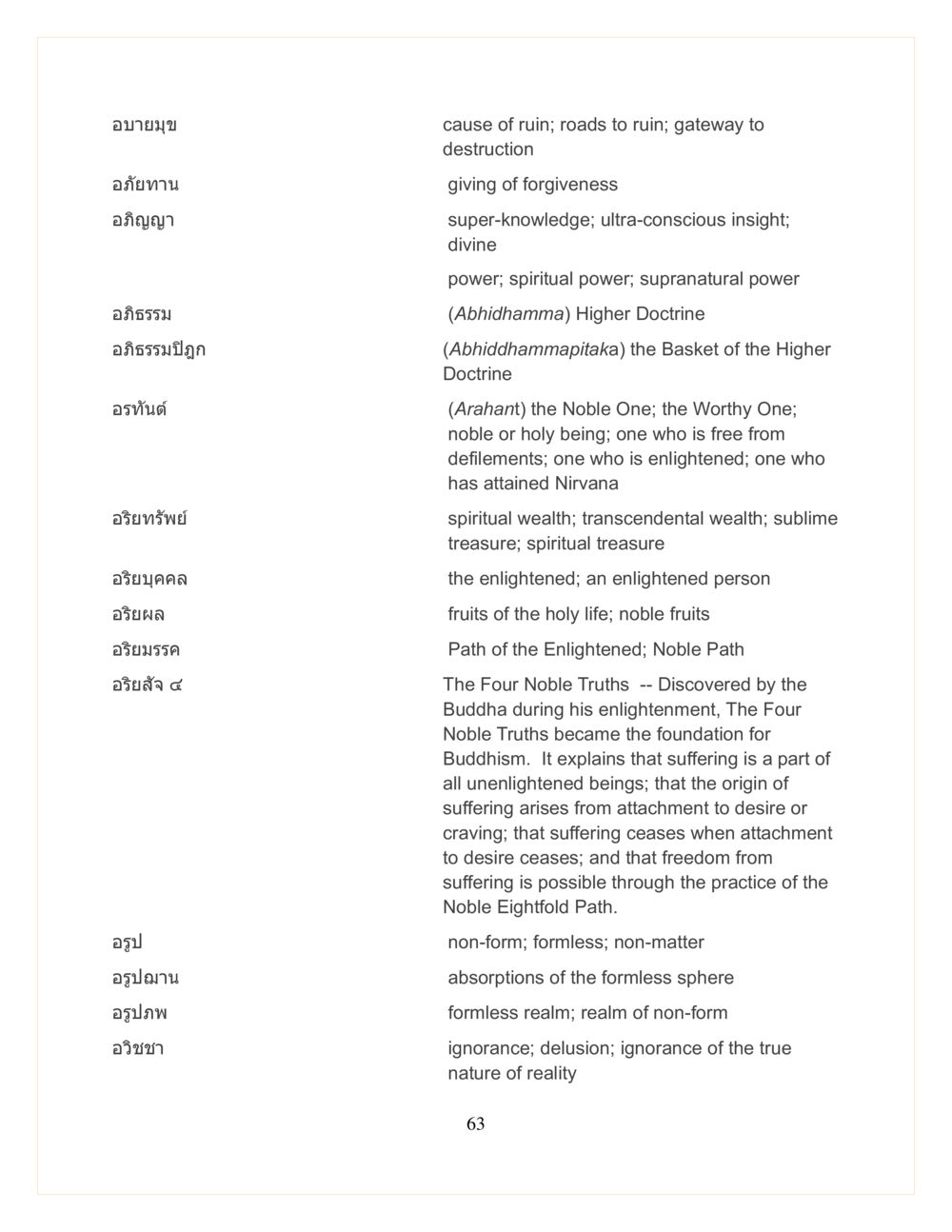Concepts of Enlightenment in Buddhism : หน้า 63/115
DMC Translor’s handbook : หน้า 63/115 Explore key Buddhist concepts such as Arahant, Noble Path, and the Four Noble Truths that lead to spiritual wealth and enlightenment.
0 ครั้ง

สรุปเนื้อหา
บทเรียนสำคัญเกี่ยวกับแนวคิดในพระพุทธศาสนา ได้แก่ อายามูชุ (ภาวะสูญเสีย), อรหันต์ (บุคคลผู้มีคุณธรรม), อริยสัจ ๔ (ความจริงอันสูงสุด ๔ ประการ) ซึ่งเป็นรากฐานในการตีความศาสนา พระพุทธเจ้าทรงค้นพบความจริงเหล่านี้ในขณะตรัสรู้ อริยผล แสดงถึงผลอันประเสริฐจากการดำเนินชีวิตในทางที่ถูกต้อง การปฏิบัติในทางที่ถูกต้องต้องใช้หลักทางอริยบรรในการฝึกฝนและพัฒนาให้ถึงอรหันต์ เพื่อหลุดพ้นจากการเวียนว่ายตายเกิดและความทุกข์ทรมานในโลกนี้
หัวข้อประเด็น
-อายามูชุ
-อรหันต์
-อริยสัจ ๔
-การเข้าถึงนิพพาน
-อวิชชา
ข้อความต้นฉบับในหน้า
อายามูชุ cause of ruin; roads to ruin; gateway to destruction
อัย Tant giving of forgiveness
อั ญ ญา super-knowledge; ultra-conscious insight; divine
อิ ธรรม power; spiritual power; supranatural power
อิธรรม Buddha (Abhidhamma) Higher Doctrine
อิทธรรมปฏิก Abhiddhammapitaka the Basket of the Higher Doctrine
อรหันต์ (Arahant) the Noble One; the Worthy One; noble or holy being; one who is free from defilements; one who is enlightened; one who has attained Nirvana
อรัญทรัพย์ spiritual wealth; transcendental wealth; sublime treasure; spiritual treasure
อริยบุคล the enlightened; an enlightened person
อริยผล fruits of the holy life; noble fruits
อริยบรร Path of the Enlightened; Noble Path
อริยสัจ ๔ The Four Noble Truths -- Discovered by the Buddha during his enlightenment, The Four Noble Truths became the foundation for Buddhism. It explains that suffering is a part of all unenlightened beings; that the origin of suffering arises from attachment to desire or craving; that suffering ceases when attachment to desire ceases; and that freedom from suffering is possible through the practice of the Noble Eightfold Path.
อรูป non-form; formless; non-matter
อรูปาน absorptions of the formless sphere
อรฺ ปภาพ formless realm; realm of non-form
อวิชชา ignorance; delusion; ignorance of the true nature of reality
Tags : #อายามูชุ #อรหันต์ #อริยสัจ ๔ #อวิชชา #อริยบุคล
หน้าหนังสือทั้งหมด
หนังสือที่เกี่ยวข้อง
Load More



















































































































